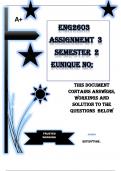Exam (elaborations)
ENG2603 Assignment 3 (COMPLETE ANSWERS) 2024 - DUE 13 September 2024
- Course
- Institution
ENG2603 Assignment 3 (COMPLETE ANSWERS) 2024 - DUE 13 September 2024 ;100% TRUSTED workings, explanations and solutions. for assistance Whats-App In Welcome to Our Hilbrow, Refentše is depicted as a creative writer who notes a problem with the suppression of writing literature in African langu...
[Show more]



